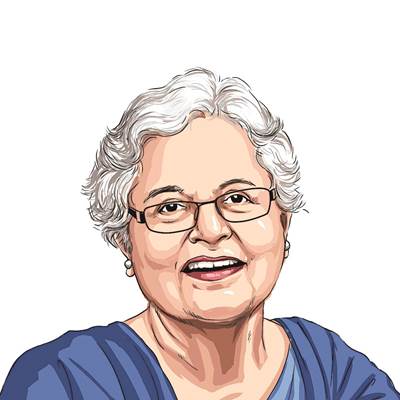Opinion The hypocritical untouchability of our parties
Can our political parties really afford to adopt intransigent positions towards other political groups?
Since we are in the era of coalitions,with no single party in a position to get near the halfway mark on its own,can our political parties really afford to adopt intransigent positions towards other political groups? The BJP,at the bottom of the political caste system,is particularly handicapped by the stigma of untouchability. But of late even the Congress has been labeled a semi-outcaste. In the present political climate,if political parties stick to their professed positions,formation of a government post May 16 will be tough. The Left claims it will have nothing to do with either the Congress or the BJP. Naveen Patnaik echoes the same sentiment. And so does Chandrababu Naidu. Mamata Banerjees TMC has made clear it will walk out of any alliance which includes the communists. And both Lalu Prasad Yadav and Ram Vilas Paswan have formed the fourth front largely to ensure that Mayawati does not become prime minister.
It would be unfortunate if our political parties allowed distaste for political rivals to cloud their judgment and hamper government formation and the ability to offer a workable administration. In a recent Idea Exchange programme with The Indian Express,senior BJP leader Yashwant Sinha made a significant point. Throughout the five years of the UPA government,Prime Minister Manmohan Singh almost never consulted the opposition. On the crucial Indo-US nuclear deal,he took all the steps to finalise the deal without taking the main opposition party into confidence. If the government had been more willing to share information with the BJP in the early stages of the negotiations,it is very likely it would have succeeded in bringing the BJP around to its point of view. After all,it was the Vajpayee government which had done the spadework with the US.
If the Congress-led government did not bother to elicit the support of the BJP till it was too late,the Left similarly refused to have any truck with the BJP in trying to prevent the deal. Sinha pointed out that the deal could have been stymied if the Left had joined hands with the BJP and other political parties and agreed to support a joint resolution in the Rajya Sabha against the N-deal. During the 2006 monsoon session of Parliament,consultations were held between JD(U)s Digvijay Singh,Natwar Singh,Amar Singh,Sitaram Yechury and Sinha on these lines. However,the Left quickly backed out after Pranab Mukherjee deprecated the CPI(M) for doing business with the BJP.
One questions the legitimacy of dubbing certain groups beyond the pale,when almost every political party in India has a skeleton or two in its closet. All our parties are guilty of practising one or other of several evils,from majority communalism,minority communalism,casteism,violence and goondagardi,to subverting democratic institutions,corruption,encouraging mafia elements,nepotism,poll rigging or just plain bad governance. What happened in Gujarat in 2002 is reprehensible,but why place it in a separate category from equally horrendous examples of large scale communal carnage such as the Mumbai riots of 1992-93 and the Sikh killings in 1984,when parties which pride themselves on their secularism,were in power? Those who now vehemently refuse to allow the stain of Gujarat 2002 to be washed away,have conveniently forgotten that in Gujarat under the Hitendra Desai government in 1969,some 2,500 had died in communal violence,which is more than double the figure of 2002. This is in no way an excuse for the action,inaction and cover-ups of the Narendra Modi government or a plea that those who are guilty should not be brought to book,no matter how long it might take — but simply to point out there are double standards at work in branding only the BJP with the untouchability stamp. Under this doctrine of untouchability,preached by the self-appointed keepers of the countrys secular spirit,it is considered morally wrong for a reputed businessperson like Ratan Tata to set up a factory in Gujarat,even if he is offered the best terms possible.
The untouchability virus is so contagious that if a party aligns with the BJP it is automatically dubbed communal and is,therefore,to be spurned. When the BJP was the clear frontrunner in the 1998 and 1999 parliamentary elections,many of the smaller parties were eager to support the NDA government and enjoy the spoils of office. The National Conference,the DMK,the Lok Janshakti Party and others woke up to protest the BJPs communal record long after the Gujarat riots,and only after they had decided to switch sides in the upcoming general elections. Publicly the political parties may talk about moral qualms,but in practical terms it is more the apprehension of losing minority votes. Ironically,the instant a party disassociates from the BJP,it stands purified. The Samajwadi Party absolved Kalyan Singh,the Chief Minister of UP when the Babri Masjid was demolished,of communalism the moment he quit the BJP.
If stable,effective governments are to be formed in our country,then our political parties have to rise above their divisive agendas and unfailing antagonism towards the other side. A coalition government should function in a spirit of compromise and give-and-take. Ideally all major parties should be taken into confidence when making important policy decisions. This constitutes what is called coalition dharma.
In the likely event of a hung verdict,political parties should respect the mandate of the 2009 elections,rather than subvert the peoples verdict for scoring political points. This is the hallmark of a mature democracy.





